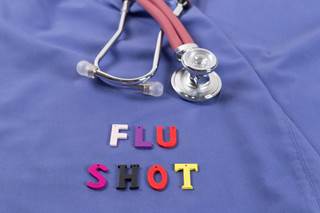Repeat Influenza Vaccination Yields Reduced Antibody Response
This article was taken from http://www.infectiousdiseaseadvisor.com on June 13, 2017.Repeat Influenza Vaccination Yields Reduced Antibody Response (June 06, 2017)
June 06, 2017
Repeat Influenza Vaccination Yields Reduced Antibody Response
Multiple vaccinations may not afford better protection against influenza viruses than fewer inoculations, according to an Australian study of vaccine responses in health care workers (HCWs) reported in Vaccine. Postvaccine protective antibody titers were highest in HCWs who were vaccinated fewer times.
Study indicates a trend toward decreased serologic response to vaccines among HCWs who were highly vaccinated compared with those who had fewer vaccines.
The high vaccine group averaged 4.8 (standard deviation (SD) 0.4) vaccinations over the previous 5 years compared with 2.2 (SD 0.9) in the low vaccine group. Mean age in the high vaccine group was higher compared with the low vaccination group (44 vs 33 years, respectively; P <.001), and they had been employed longer (7 vs 2 years, respectively; P <.001).
Vaccine effectiveness (VE) to A/H3N2 virus over 5 years in the United States was shown in an earlier study2 to be highest among individuals who had not been previously vaccinated (VE 65%, 95% CI: 36%-80%) compared with those who had received 4 to 5 vaccines over the period (VE 24%, 95% CI: 3%-41%).
“This was a study of immunogenicity, not vaccine effectiveness,” Dr Sullivan pointed out, noting that “Immunogenicity is only a proxy of protection. Immunogenicity was assessed against the vaccine strains, which does not necessarily provide us information about the protection afforded against circulating influenza strains.” The decline in antibody response to the A/California/7/2009 strain may have been associated with lessened opportunity for boosting due to circulating strains that season, the authors observed.
The results of this study indicate a trend toward decreased serologic response to vaccines among HCWs who were highly vaccinated compared with those who had fewer vaccines, although the investigators contend that current guidelines for annual vaccination should not yet be changed. “I would not make any recommendation for changing a policy on the basis of just one study,” Dr Sullivan wrote. “Further research is needed to confirm or refute our findings before considering policy changes.”
References
Leung VKY, Carolan LA, Worth LJ, et al. Influenza vaccination responses: evaluating impact of repeat vaccination among health care workers. Vaccine. 2017;35:2558-2568. doi: 10.1016/j.vaccine.2017.03.063
McLean HQ, Thompson MG, Sundaram ME, et al. Impact of repeated vaccination on vaccine effectiveness against influenza A (H3N2) and B during 8 seasons. Clin Infect Dis. 2014;59:1375-1385. doi: 10.1093/cid/ciu680
More
June 13, 2017 More on the topic above.
Study: Repeated Flu Shots Decrease Antibody Response – More Evidence that Annual Flu Shots are Worthless
http://vaccineimpact.com/2017/study-repeated-flu-shots-decreases-antibody-response-more-evidence-that-annual-flu-shots-are-worthless/